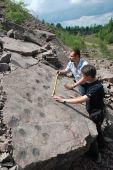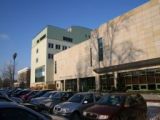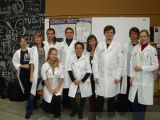|
If your goal is to study cutting-edge
science, uncover Nature’s secrets by designing and performing
sophisticated experiments using modern research techniques and
equipment, and gain the upper hand in today’s competitive market place,
then
study with us at the Faculty of Biology, University of Warsaw.
Biological Sciences are a vibrant,
dynamic field of research fundamental to the development of modern
Medicine, Agriculture, Biomaterials, Renewable Energy and many more
areas of human activity crucial to the Mankind’s future.
|
|
read more...
|
|
 Grzegorz Niedźwiedzki, a doctoral student at the Faculty of Biology, has
discovered and described the earliest tetrapod tracks. The science
magazine Nature of 7th January publishes a paper „Tetrapod trackways
from the early Middle Devonian of Poland” describing fossilized tracks
of earliest tetrapod vertebrates that roamed the land. The traces, found
in Zachełmie quarry in southern Poland, are by ca. 20 mln years older
than any other similar tracks known to date. They originated in marine
rather than, as commonly postulated, freshwater environment. This
discovery markedly changes our understanding of the origins of tetrapods
– our own distant ancestors.
Grzegorz Niedźwiedzki, a doctoral student at the Faculty of Biology, has
discovered and described the earliest tetrapod tracks. The science
magazine Nature of 7th January publishes a paper „Tetrapod trackways
from the early Middle Devonian of Poland” describing fossilized tracks
of earliest tetrapod vertebrates that roamed the land. The traces, found
in Zachełmie quarry in southern Poland, are by ca. 20 mln years older
than any other similar tracks known to date. They originated in marine
rather than, as commonly postulated, freshwater environment. This
discovery markedly changes our understanding of the origins of tetrapods
– our own distant ancestors.
|
|
read more...
|
|
Dr. James Watson, co-discoverer of DNA structure, visits Faculty of Biology |
|
|
 The history of the Faculty of Biology is almost as long as that of the
University of Warsaw, despite the fact that at the inception of the
Royal University of Warsaw in 1816, none of the names its five Faculties
referred to “Biology”. The natural sciences taught at the Faculty of
Philosophical Skills were Geology, Zoology, Botany and Anthropology. The
Botanical Garden was opened in 1817, in the Łazienki park under the
tutelage of the pioneer in plant anatomy and morphology, Prof. Michał
Szubert (1787-1860).
The history of the Faculty of Biology is almost as long as that of the
University of Warsaw, despite the fact that at the inception of the
Royal University of Warsaw in 1816, none of the names its five Faculties
referred to “Biology”. The natural sciences taught at the Faculty of
Philosophical Skills were Geology, Zoology, Botany and Anthropology. The
Botanical Garden was opened in 1817, in the Łazienki park under the
tutelage of the pioneer in plant anatomy and morphology, Prof. Michał
Szubert (1787-1860).
|
|
read more...
|
|
Our team wins gold in iGEM 2010 competition |
|
 Our students’ team has won gold medal in the iGEM 2010 competition.
Our students’ team has won gold medal in the iGEM 2010 competition.
The
annual iGEM (international Genetically Modified Machine) competition
has been organized since 2004 by the Massachusetts Institute of
Technology, Boston, USA. Its main aim is to propagate synthetic biology
among students from around the world. Its leading idea is creation of
so-called BioBricks – standardized genetic elements or cassettes that
can be used to construct organisms of required characteristics.
|
|
read more...
|
|
University of Warsaw was founded in 1816 and is Poland's largest and finest university.
Today UW employs over 6,030 personnel,
including 3,170 academic teachers and educates almost 55,400
undergraduate and graduate students. Each year about 17,000 young people
enroll as students at the University of Warsaw.
The Faculty of Biology is one of 19 faculties of the University of Warsaw.
Since 2000, Faculty of Biology is
located in a modern building in the “Ochota Campus”. Near our Faculty
are located: other experimental University Faculties: Chemistry,
Geology, Physics, and Mathematics, Warsaw Medical University, and
several biomedical institutes of the Polish Academy of Sciences.
|
|
read more...
|
|